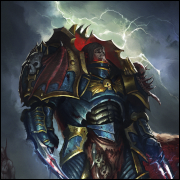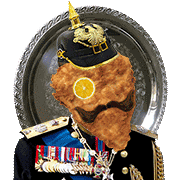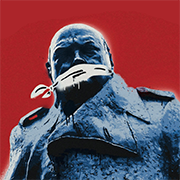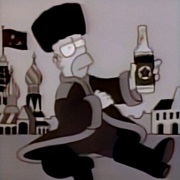|
Does anyone have a recommendation for a hook on the Confederation Era before the adoption of the Constitution? I feel like this is a seldom talked about part of American history and we jump straight from Yorktown to the Constitution and George Washington. I have We have not a Government- The Articles of Confederation but it's pretty dry. Bonus points if you can recommend something that is on audio book.
|
|
|
|

|
| # ? May 17, 2024 07:15 |
|
FPyat posted:I have a lack of books about modern Japan that aren't narrowly focused on the years 1941-45, other than Embracing Defeat. "Showa" by Shigeru Mizuki is a manga, and huge, but it covers the author's experience of life in 20th century (1926-1989) Japan in some detail.
|
|
|
|
FPyat posted:Anything that gives me more understanding of the local differentiation of particular islands, regions, and cities would be of particular interest. Another question that captures my curiosity is why Japanese politics went so terribly wrong in the 1920s. I'd second the Brix Hirohito book then. I don't think I've ever seen anything on the first subject. Joy Hendry might be of interest, I haven't read her books yet but she did some close anthropological studies in the Japanese countryside. I'm enjoying this book a lot, it's mostly interviews with day laborers around 1990. https://www.goodreads.com/book/show/71020.San_ya_Blues There's some stuff about other areas in Japan since a lot of the people came from all over to find work. Very different view of society than most books. This is Tokyo centric but if you want to understand more about why Japanese cities are the way they are, it's the best I've read. https://oroeditions.com/product/emergent-tokyo Grand Fromage fucked around with this message at 20:00 on Sep 18, 2022 |
|
|
|
So, my knowledge of naval technology and warfare has a huge gap from about 1812 through to 1942. What's a good intro book to ironclad/pre-dreadnought through dreadnought/WW1 naval combat? Or anything more specifically focused in any of those areas is fine.
|
|
|
|
Count Thrashula posted:So, my knowledge of naval technology and warfare has a huge gap from about 1812 through to 1942. What's a good intro book to ironclad/pre-dreadnought through dreadnought/WW1 naval combat? Or anything more specifically focused in any of those areas is fine. How technical/dry are you interested in?
|
|
|
|
Shimrra Jamaane posted:How technical/dry are you interested in? I'm okay with dry, but I'd like to avoid books that are just data sheets of various war ships
|
|
|
|
Count Thrashula posted:So, my knowledge of naval technology and warfare has a huge gap from about 1812 through to 1942. What's a good intro book to ironclad/pre-dreadnought through dreadnought/WW1 naval combat? Or anything more specifically focused in any of those areas is fine.
|
|
|
|
Can anyone please recommend me a good book about the history of Glasgow?
|
|
|
|
Kaiser Schnitzel posted:Dreadnaught by Robert Massie is great and covers ~1870ish-1914ish. Castles of Steel is also good but itís more narrowly a history of the naval part of WWI. Unfortunately Dreadnaught only touches on the actual naval arms race and especially the technological development. Itís just not that kind of book, itís really a general leadup to WWI book. Castles of Steel is very in-depth with the WWI naval war though.
|
|
|
|
Shimrra Jamaane posted:How technical/dry are you interested in? most of naval history is fairly wet, if i'm not mistaken
|
|
|
|
blue squares posted:most of naval history is fairly wet, if i'm not mistaken They're called drydocks bro.
|
|
|
|
Shimrra Jamaane posted:Unfortunately Dreadnaught only touches on the actual naval arms race and especially the technological development. Itís just not that kind of book, itís really a general leadup to WWI book. Castles of Steel is very in-depth with the WWI naval war though. It's been forever since I read it but I thought I remembered a fair bit of chat about big guns and thicknesses of armor plate etc, but you are definitely right that it's much broader than just big ships. It gives great context to those big ships, however.
|
|
|
|
Took me two months but I sat down and read all of The Power Broker by Robert Caro. I thought I went in understanding that Robert Moses was kind of a creep, but good lord. Just an absolutely incredible book about how American cities were built and power is accumulated and weaponized. I'm also looking for a book that could give me a solid understanding of unification of italy, nothing I've found so far has really worked for helping it form concretely in my mind.
|
|
|
|
Shimrra Jamaane posted:Unfortunately Dreadnaught only touches on the actual naval arms race and especially the technological development. Itís just not that kind of book, itís really a general leadup to WWI book. Castles of Steel is very in-depth with the WWI naval war though. Yeah, I finally got around to starting it yesterday and it's interesting, but so far it has gently caress all to do with ships. From the contents it looks like maybe eventually it will.
|
|
|
|
The part about the Navy is just a 150 page diversion but it's a good one.
|
|
|
|
Nerdietalk posted:I'm also looking for a book that could give me a solid understanding of unification of italy, nothing I've found so far has really worked for helping it form concretely in my mind. Christopher Duggan's The Force of Destiny: A History of Italy since 1796. The entire book obviously goes beyond it but the unification is a big chunk and it's pretty concise.
|
|
|
|
Finally getting my copy of Collapse: The Fall of the Soviet Union today from the library. Excited to read it.
|
|
|
|
So Iíve read Black Elk Speaks, Bury my Heart at Wounded Knee, Son of the Morning Star, and 1491, and Iím really wanting more Native American historical perspectives of the Indian wars and in general, so looking for recommendations in that vein. I was recommended An Indigenous Peoplesí History of the United States so thatís on my list, but thereís gotta be more out there.
|
|
|
|
Devlan Mud posted:So Iíve read Black Elk Speaks, Bury my Heart at Wounded Knee, Son of the Morning Star, and 1491, and Iím really wanting more Native American historical perspectives of the Indian wars and in general, so looking for recommendations in that vein. I read Facing East from Indian Country: A Native History of Early America by Daniel K. Richter in college and felt it was a pretty good overview of early American history from Native perspectives. This might not be exactly what you're looking for but I'll also take the opportunity to promote We Are the Land: A History of Native California by Damon Akins and William J. Bauer. Akins was my professor in college who assigned Facing East.
|
|
|
|
Chairman Capone posted:I read Facing East from Indian Country: A Native History of Early America by Daniel K. Richter in college and felt it was a pretty good overview of early American history from Native perspectives. Facing East is in my wishlist so Iím sure itís been mentioned before, and I will absolutely look at We Are the Land, thanks a bunch!
|
|
|
|
Devlan Mud posted:So Iíve read Black Elk Speaks, Bury my Heart at Wounded Knee, Son of the Morning Star, and 1491, and Iím really wanting more Native American historical perspectives of the Indian wars and in general, so looking for recommendations in that vein. The Last Days of the Incas by Kim MacQuarrie Empire of the Summer Moon by S. C. Gwynne
|
|
|
|
any good histories of Neo-Nazism, strictly the directly connected to Nazi Germany kind? As in like, the WW2 era Nazi officials and officers who escaped or just smuggled out others, served as scientists and mercenaries for the most brutal Cold War Western/Western-backed governments, founded Neo-Nazi parties, maybe got caught. It feels like a lot of them just got hired by the Allies or allowed to just churn out memoirs and Wehrmacht propaganda like I only just learned about this complete "Hitler is Vishnu" psychopath https://en.wikipedia.org/wiki/Savitri_Devi and this one whose sister got executed by the Nazis!! https://en.wikipedia.org/wiki/Adolf_von_Thadden or this rear end in a top hat https://en.wikipedia.org/wiki/Hans-Ulrich_Rudel or just like, Klaus Barbie getting hired by the West Germans and Counterintelligence Corps, or Skorzeny supposedly advising Peron and (maybe) working for the Mossad. just so many horrifying stories and histories of how feeble "Denazification" was that don't really get told, not surprisingly though. I guess it'd also be a history of postwar West German culture and politics. I do already have Postwar: A History of Europe Since 1945. Need to keep reading that, but I was thinking something more focused. Punkin Spunkin fucked around with this message at 06:43 on Sep 22, 2022 |
|
|
|
Punkin Spunkin posted:any good histories of Neo-Nazism, strictly the directly connected to Nazi Germany kind? As in like, the WW2 era Nazi officials and officers who escaped or just smuggled out others, served as scientists and mercenaries for the most brutal Cold War Western/Western-backed governments, founded Neo-Nazi parties, maybe got caught. Well do you want actual historical accounts of the fundamentally flawed and disingenuous process of Denazification, the proliferation of Neo-Nazis in both government and society in general, the downplaying of Nazi atrocities for propaganda and ideological purposes, and the tacit encouragement for a groundswell of Nazi revanchism or are you interested in stuff not solely focused on East Germany as well? Shimrra Jamaane fucked around with this message at 14:14 on Sep 22, 2022 |
|
|
|
Punkin Spunkin posted:any good histories of Neo-Nazism, strictly the directly connected to Nazi Germany kind? As in like, the WW2 era Nazi officials and officers who escaped or just smuggled out others, served as scientists and mercenaries for the most brutal Cold War Western/Western-backed governments, founded Neo-Nazi parties, maybe got caught. Maybe not quite what you're thinking of, but I can recommend Eichmann Before Jerusalem. It's obviously focused on him, but it also covers the Nazi diaspora in South America, and their pipe-dreams for a return to power in Germany in some detail. https://www.nytimes.com/2014/09/07/books/review/eichmann-before-jerusalem-by-bettina-stangneth.html Also not quite what you're asking, but The Myth of the Eastern Front covers the post-war whitewashing of the Wehrmacht by German officers with the grateful cooperation of Western militaries. It specifically covers Franz Halder and the most successful propaganda memoirists and mil-fic writers. but it's more about Wehraboos than outright Neo-Nazis. https://www.foreignaffairs.com/reviews/capsule-review/2008-05-03/myth-eastern-front-nazi-soviet-war-american-popular-culture
|
|
|
|
Punkin Spunkin posted:any good histories of Neo-Nazism, strictly the directly connected to Nazi Germany kind? As in like, the WW2 era Nazi officials and officers who escaped or just smuggled out others, served as scientists and mercenaries for the most brutal Cold War Western/Western-backed governments, founded Neo-Nazi parties, maybe got caught. Right, stories about feeble Denazification that don't get told. Probably the definitive work on deliberate recruitment of ex gestapo members into a brutal surveillance state's apparatus of oppression is Henry Leide's "NS-Verbrecher und Staatssicherheit: Die geheime Vergangenheitspolitik der DDR (ANALYSEN UND DOKUMENTE)". It's in German only, sorry. Unfortunately it and its findings haven't really penetrated into the English speaking world, to the point where Frank McDonough was claiming seven years after its publication that it was hard to find many stasi officers who worked for the gestapo. Which is odd when Leide has documented the process of multiple life sentences for ex gestapo men being commuted in return for them joining the stasi, where they became senior officers and their crimes were concealed in order to preserve the image of the regime. https://www.amazon.com/gp/product/352535018X/ref=dbs_a_def_rwt_hsch_vapi_taft_p1_i0 As I said, this information really hasn't penetrated much into the anglosphere, so it's very likely that it'll all be new to you, especially given how you seem to mostly be familiar with examples in the West. There's some real charmers to be found, like Willy Lšritz, who gained a reputation in the Staatssicherheitsdienst for "heavy-handed" interrogation techniques, who was originally recruited because of the compromising information he had on other former Nazis who they wanted to recruit. Here's a Deutsche Welle article about the book in english for a small taste: https://www.dw.com/en/book-claims-stasi-employed-nazis-as-spies/a-1760980
|
|
|
|
The first like 50 pages of Collapse are insanely brutal to Gorbachev. Just slam after slam.
|
|
|
|
Lawman 0 posted:The first like 50 pages of Collapse are insanely brutal to Gorbachev. I have yet to read it but even though Zubok is no big fan of the USSR he can approach the subject from the angle of ďwell, if the leader of the Soviet Union is aiming to try to keep everything together this is how Gorby hosed it all upĒ
|
|
|
|
Shimrra Jamaane posted:I have yet to read it but even though Zubok is no big fan of the USSR he can approach the subject from the angle of ďwell, if the leader of the Soviet Union is aiming to try to keep everything together this is how Gorby hosed it all upĒ I mean it's a little mean but the guy was basically acting like he was cramming for a final. If he didn't try to do prohibition immediately and Chernobyl didn't happen maybe things would have just muddled along.
|
|
|
|
Thanks for the recs. Grabbing the ones I can. The Myth of the Eastern Front will be a nice read particularly as I'm still getting through some more David Stahel.Shimrra Jamaane posted:Well do you want actual historical accounts of the fundamentally flawed and disingenuous process of Denazification, the proliferation of Neo-Nazis in both government and society in general, the downplaying of Nazi atrocities for propaganda and ideological purposes, and the tacit encouragement for a groundswell of Nazi revanchism or are you interested in stuff not solely focused on East Germany as well?
|
|
|
|
On the subject of WWII, this book of maps by the Smithsonian is on sale today on Kindle: https://www.amazon.com/dp/B07Z19MD1S I'm a sucker for maps.
|
|
|
|
Shimrra Jamaane posted:I have yet to read it but even though Zubok is no big fan of the USSR he can approach the subject from the angle of ďwell, if the leader of the Soviet Union is aiming to try to keep everything together this is how Gorby hosed it all upĒ Yeah but even as an aside he noted that Andropov was the guy who convinced Brezhnev to invade Afghanistan "because it would just be a short-term operation" so I think there is alot of blame to go around. Zubok really lays it on thick that the USSR was spinning too many plates at once.
|
|
|
|
what's good book on the austro-hungarian empire, preferably near the end. i have been playing isonzo(great game) and reading the white war and i am curious to know more about the empire because its such a weird and odd duck europian empire wise.
|
|
|
|
Dapper_Swindler posted:what's good book on the austro-hungarian empire, preferably near the end. i have been playing isonzo(great game) and reading the white war and i am curious to know more about the empire because its such a weird and odd duck europian empire wise. This is kind of difficult because there are really two very very divergent schools of thought on the AHE especially regarding its dissolution. There has been a lot of newer academic work aimed at discrediting the Second Sick Man of Europe thesis but to say itís still contentious is an understatement.
|
|
|
|
Dapper_Swindler posted:what's good book on the austro-hungarian empire, preferably near the end. i have been playing isonzo(great game) and reading the white war and i am curious to know more about the empire because its such a weird and odd duck europian empire wise. https://www.goodreads.com/book/show/27311725-the-habsburg-empire I also learned a ton about the AHE from Christopher Clarke's The Sleepwalkers but, I started out knowing very little about it at all.
|
|
|
|
Does anyone have a recommendation for something on the history of Armenia? I've read about them in the context of the genocide but am interested in a more general overview of the people/region.Dapper_Swindler posted:what's good book on the austro-hungarian empire, preferably near the end. i have been playing isonzo(great game) and reading the white war and i am curious to know more about the empire because its such a weird and odd duck europian empire wise. I'm sure there are more detailed books on the topic but I enjoyed A Mad Catastrophe by Geoffrey Wawro. Focuses on how much of a mess the empire was and the various mistakes made in the leadup to/beginning of WW1.
|
|
|
|
Gnoll posted:Does anyone have a recommendation for something on the history of Armenia? I've read about them in the context of the genocide but am interested in a more general overview of the people/region. I would point out that Wawro has an almost entirely opposite view of the later AHE than a historian like Clark.
|
|
|
|
Shimrra Jamaane posted:I would point out that Wawro has an almost entirely opposite view of the later AHE than a historian like Clark. Oh definitely, the book is a fun enough read as a never ending stream of fuckups but even as someone new to the subject it felt focused on pushing a particular view of things. I would second The Sleepwalkers recommendation as well.
|
|
|
|
Dapper_Swindler posted:what's good book on the austro-hungarian empire, preferably near the end. i have been playing isonzo(great game) and reading the white war and i am curious to know more about the empire because its such a weird and odd duck europian empire wise. The First World War and the End of the Habsburg Monarchy 1914-1918 by Manfried Rauchensteiner, if you want military history. It's massive and a bit pricey, but there's a legitimate free download available: http://www.zukunftsfonds-austria.at/publications.php
|
|
|
|
Shimrra Jamaane posted:This is kind of difficult because there are really two very very divergent schools of thought on the AHE especially regarding its dissolution. There has been a lot of newer academic work aimed at discrediting the Second Sick Man of Europe thesis but to say itís still contentious is an understatement. interesting. i can believe its contentious. from reading, it sounds like the empire worked well enough on a basic level and was even pretty progressive for a weird monarchy thing. its just nationalism became way bigger way faster and the whole concert of europe imploding kinda hosed them along with the Ferdinand eating a bullet since he theoretically would have been able to keep it going a little longer. Gnoll posted:Oh definitely, the book is a fun enough read as a never ending stream of fuckups but even as someone new to the subject it felt focused on pushing a particular view of things. yeah, i bought waro book and The Habsburg Empire: A New History by Pieter M. Judson that were both recommend here.
|
|
|
|

|
| # ? May 17, 2024 07:15 |
|
I get the impression that the emperor was just too drat old in the last 20 years of his life to push for needed reform. Could an earlier death have helped? I donít know.
|
|
|





























